- Clone
- HI100 (See other available formats)
- Regulatory Status
- RUO
- Workshop
- IV N906
- Other Names
- GP180, L-CA, LCA, LY5, T200, PTPRC
- Isotype
- Mouse IgG2b, κ
- Ave. Rating
- Submit a Review
- Product Citations
- publications
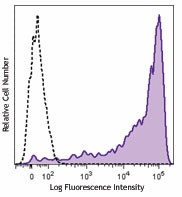
-

Human peripheral blood lymphocytes stained with CD45RA (clone HI100) Brilliant Violet 711™.
| Cat # | Size | Price | Quantity Check Availability | Save | ||
|---|---|---|---|---|---|---|
| 304137 | 25 tests | 172€ | ||||
| 304138 | 100 tests | 348€ | ||||
CD45RA is a 205-220 kD single chain type I glycoprotein. It is an exon 4 splice variant of the tyrosine phosphatase CD45. The CD45RA isoform is expressed on resting/naïve T cells, medullary thymocytes, B cells and monocytes. CD45RA enhances both T cell receptor and B cell receptor signaling. CD45 non-covalently associates with lymphocyte phosphatase-associated phosphoprotein (LPAP) on T and B lymphocytes. CD45 has been reported to be associated with several other cell surface antigens including CD1, CD2, CD3, and CD4. CD45 has also been reported to bind galectin-1. CD45 isoform expression can change in response to cytokines.
Product DetailsProduct Details
- Reactivity
- Human
- Antibody Type
- Monoclonal
- Host Species
- Mouse
- Formulation
- Phosphate-buffered solution, pH 7.2, containing 0.09% sodium azide and BSA (origin USA).
- Preparation
- The antibody was purified by affinity chromatography and conjugated with Brilliant Violet 711™ under optimal conditions.
- Concentration
- Lot-specific (to obtain lot-specific concentration and expiration, please enter the lot number in our Certificate of Analysis online tool.)
- Storage & Handling
- The antibody solution should be stored undiluted between 2°C and 8°C, and protected from prolonged exposure to light. Do not freeze.
- Application
-
FC - Quality tested
- Recommended Usage
-
Each lot of this antibody is quality control tested by immunofluorescent staining with flow cytometric analysis. For flow cytometric staining, the suggested use of this reagent is 5 µl per million cells in 100 µl staining volume or 5 µl per 100 µl of whole blood.
Brilliant Violet 711™ excites at 405 nm and emits at 711 nm. The bandpass filter 710/50 nm is recommended for detection, although filter optimization may be required depending on other fluorophores used. Be sure to verify that your cytometer configuration and software setup are appropriate for detecting this channel. Refer to your instrument manual or manufacturer for support. Brilliant Violet 711™ is a trademark of Sirigen Group Ltd.
Learn more about Brilliant Violet™.
This product is subject to proprietary rights of Sirigen Inc. and is made and sold under license from Sirigen Inc. The purchase of this product conveys to the buyer a non-transferable right to use the purchased product for research purposes only. This product may not be resold or incorporated in any manner into another product for resale. Any use for therapeutics or diagnostics is strictly prohibited. This product is covered by U.S. Patent(s), pending patent applications and foreign equivalents. - Excitation Laser
-
Violet Laser (405 nm)
- Application Notes
-
Additional reported applications (for relevant formats of this clone) include: inhibition of CD45 functions2, immunohistochemical staining of frozen tissue sections3 and formalin-fixed paraffin-embedded tissue sections4, and immunocytochemistry15,16.
-
Application References
(PubMed link indicates BioLegend citation) -
- Knapp W, et al. 1989. Leucocyte Typing IV. Oxford University Press. New York.
- Yamada T, et al. 2002. J. Biol. Chem. 277:28830. (WB, Block)
- Weninger W, et al. 2003 J. Immunol. 170:4638. (IHC-F)
- Imanguli MM, et al. 2009. Blood. 113:3620 (IHC-P)
- Roque S, et al. 2007. J. Immunol. 178:8028. (FC) PubMed
- Smeltz RB. 2007. J. Immunol. 178:4786. (FC) PubMed
- Palendira U, et al. 2008. Blood (FC) PubMed
- Kuttruff S, et al. 2009. Blood 113:358. (FC) PubMed
- Thakral D, et al. 2008. J. Immunol. 180:7431. (FC) PubMed
- Alanio C, et al. 2010. Blood 115:3718. (FC) PubMed
- Iannello A, et al. 2010. J. Immunol. 184:114. (FC) PubMed
- Yoshino N, et al. 2000. Exp. Anim. (Tokyo) 49:97. (FC)
- Guereau-de-Arellan M, et al. 2011. Brain. 134:3578. PubMed
- Canque B, et al. 2000. Blood 96:3748. (ICC)
- Imanguli MM, et al. 2009. Blood 13:3620. (ICC)
- Stoeckius M, et al. 2017. Nat. Methods. 14:865. (PG)
- Peterson VM, et al. 2017. Nat. Biotechnol. 35:936. (PG)
- Product Citations
- RRID
-
AB_11218999 (BioLegend Cat. No. 304137)
AB_2563815 (BioLegend Cat. No. 304138)
Antigen Details
- Structure
- Tyrosine phosphatases, type I transmembrane (exon 4 splicing of CD45 gene), 205-220 kD
- Distribution
-
B cells, naïve T cells, monocytes
- Function
- Enhances TCR and BCR signaling
- Ligand/Receptor
- Galectin-1, CD2, CD3, CD4
- Cell Type
- B cells, Monocytes, T cells, Tregs
- Biology Area
- Cell Biology, Immunology, Inhibitory Molecules, Neuroscience, Neuroscience Cell Markers
- Molecular Family
- CD Molecules
- Antigen References
-
1. Thomas M. 1989. Annu. Rev. Immunol. 7:339.
2. Trowbridge I, et al. 1994. Annu. Rev. Immunol.12:85. - Gene ID
- 5788 View all products for this Gene ID
- UniProt
- View information about CD45RA on UniProt.org
Customers Also Purchased
Compare Data Across All Formats
This data display is provided for general comparisons between formats.
Your actual data may vary due to variations in samples, target cells, instruments and their settings, staining conditions, and other factors.
If you need assistance with selecting the best format contact our expert technical support team.
 Login / Register
Login / Register 











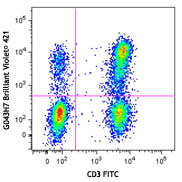
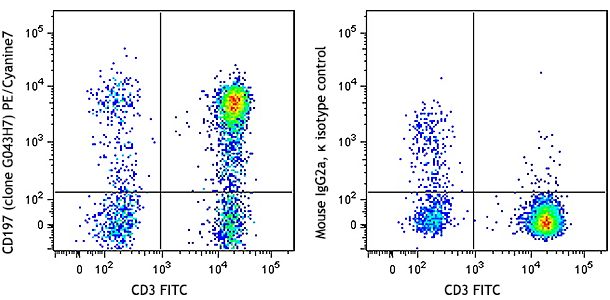
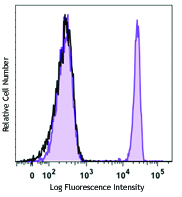
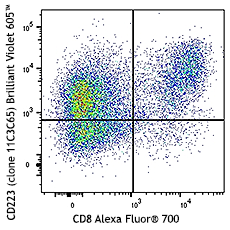



Follow Us